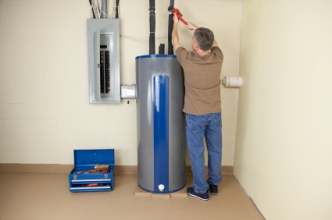How Do You Heat Your Water?

Unless you are building a new home or are trying to make your current home more energy-efficient, you probably don't think much about how your water gets hot. In fact, chances are good that if you are buying a new water heater, your old one is on its last legs or no longer works at all.
Consumers now have more choices when it comes to water heaters than in the past. These days, the standard tank water heater has some eco-friendly tankless competition, but even tank heaters are available in high-efficiency models. It is estimated that we spend up to 30 percent of our home's energy budget on heating water, so making a good choice can pay off for years to come.
Storage Heaters
Storage-type water heaters are still the standard. They are less expensive than tankless heaters, though the highest efficiency models can cost upward of $1,000. They are generally available in 20-80 gallon sizes and are fueled by electric, natural gas, propane or fuel oil. They work by heating a tank of water to a set temperature. When water is used, the tank replaces the water and heats it to the set temperature. Since the heater must maintain the tank water's temperature, standby energy loss occurs.
When to Consider: If you are replacing a tank unit in a household with many simultaneous hot water needs, or if you have a small up-front budget, consider getting a storage tank water heater.
- Capacity: You need a heater that will provide enough hot water to get you through the day comfortably. Determine this by calculating your peak hour usage: how much hot water your household uses during the hour when the most water is used. The model's first hour rating (FHR), or how many gallons of hot water the heater can supply per hour starting with a tank of hot water, should be within a few gallons of your peak hour usage. The FHR is located on the EnergyGuide label, which is required on all tank heaters.
- Energy: If saving energy is a priority, look for a water heater with a high energy factor (EF). The number is the decimal equivalent of a percent efficiency. If a unit is .90 EF, it is 90% efficient. The amount of insulation on a tank is also important. Energysavers.gov suggests looking for a thermal resistance rating (R-Value) between R-12 and R-25.
- Cost: Storage heaters run $300-500, plus another $300 for installation. Avoid choosing a system based on cost and size. Lower costs up-front can be lost in energy and maintenance costs. Likewise, choosing a unit because it is big enough to cover more than your needs is a waste. If a heater exceeds your needs you will have paid more up-front and will have to pay more to keep all that extra water heated. Consumer Reports found that tanks offering the longest warranties had larger heating elements, thicker insulation and longer anodes (corrosion fighting metal rods). The estimated operating cost per year is located on the EnergyGuide label.
Tankless Water Heaters
Not having a tank means no wasted standby energy. The water is heated on demand, which is why it is sometimes called a demand or instantaneous heater. When a hot water tap is turned on, cold water runs through the pipe and into a unit that heats the water. Tankless water heaters come as whole-house units or point-of-use (a series of heaters near each tap or appliance) units. The advantage of going tankless is that it provides a continuous source of hot water. The disadvantage is that many can only provide 2-5 gallons of hot water per minute. Gas units provide better flow.
When to Consider: If energy conservation is extremely important to you, you are building a new home, you have a larger up-front budget and you have access to gas fuel, a tankless water heater may be a good option.
- Capacity: To choose a unit that is best for your needs, you need to calculate the gallons per minute (gpm) that you use during the peak period of the day. We'll use 7 gpm for this example. Groundwater temperature also comes into play. You need to know how many degrees your water needs to be heated to get to a desired temperature (usually 120°F). The difference is the rise. Let's say at the coldest point in the year your groundwater is 40°. You will need to get a heater rated to produce at least 7 gpm at an 80° rise.
- Energy: Depending on how many gallons of water are used per day, tankless water heaters can be 24 to 50 percent more efficient than a standard tank heater. If it is fueled by gas, look for a pilot light that is not constantly lit.
- Cost: Tankless heaters can run $800-$1,200 or more for installation if pipes, electric and ventilation need to be upgraded or modified. Tankless heating can save $70-80 a year in energy costs.
Depending on your infrastructure, your budget and your water usage habits, a high-efficiency storage tank-type water heater may be the right choice for your home. If you are concerned about energy efficiency and you have the right conditions, you should opt for a tankless water heater for you new construction or to replace your old heater.
Looking for a Pro? Call us (866) 441-6648

Plumbing Average Costs
Plumbers Experiences

Hot Water Heater Replacement By A Family Of Experts

Our Kitchen Faucet And Pipe Replacement



